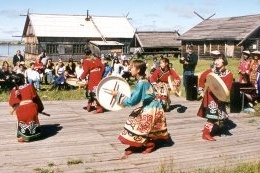The Nanai language is used by the Nanai people who live in Siberia. The language is also spoken to a small extent in China, where it is known as Hezhe. Other terms that are used to refer to the Nanai language is Gold, Goldi, Heche, Nanaj and Hezhen. There are about 12,000 people who are ethnically Nanai’s, but out of all these only about 3,000 people can speak the language. Most Nanai’s can speak other languages such as Chinese and Russian fluently. This is highly prelevant among the younger generation. The Nanai language has been on a gradual decline through the years. By the 1980s, use of the language was limited to private contexts and among family members.
The Nanai language falls under the Tungus group of languages. It is closely related to the Orok and Ulchi languages. The Nanai language has different dialects. This includes the Upper Amur dialects, Middle Amur dialects and the Lower Amur dialects. All these dialects have sub dialects. There are distinctions between the different dialects. Nanai was first written by the Russian missionaries using the Russian alphabet. They used this to translate some religious texts into the Nanai language. During the 1930s the Latin alphabet was introduced. This was changed to the Cyrillic alphabet since 1937, which is still being used up to date. The written language was based on the Naihin dialect. In China, the Hezhe used Chinese for their writing system.
The Nanai language has been classified as being severely endangered. This is mainly because it is mainly older adults who prefer to speak the language. The youngest speakers are aged 30 years and above, while most speakers are more than 50 years old. Due to the threat of extinction, several efforts have been made to preserve the Nanai language. The language is taught in secondary schools in Russia, but mainly in Nanai villages. There are also Nanai text books, fairy tales and various other literature used in the teaching of the language. Some newspapers occasionally include articles in the Nanai language and some TV stations broadcast Nanai programs.
